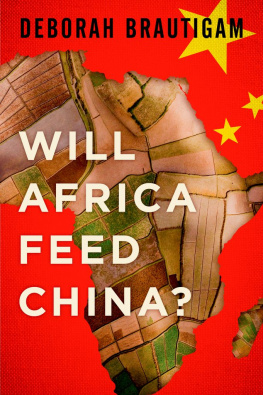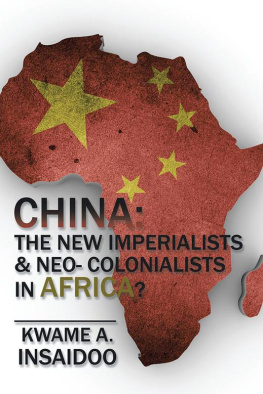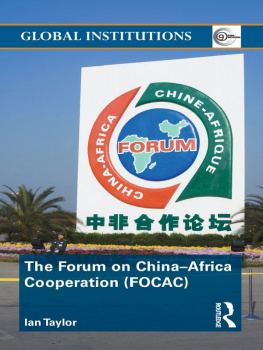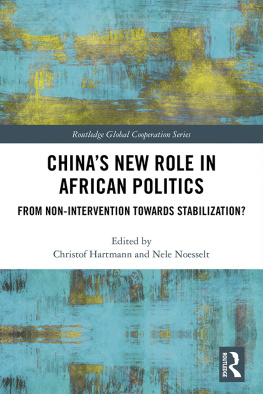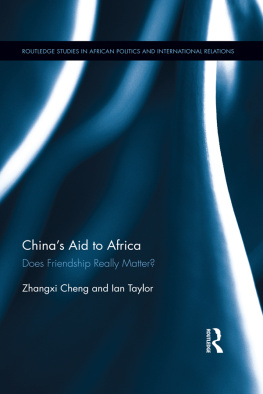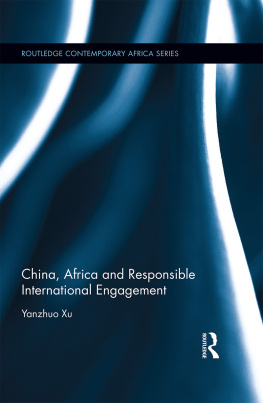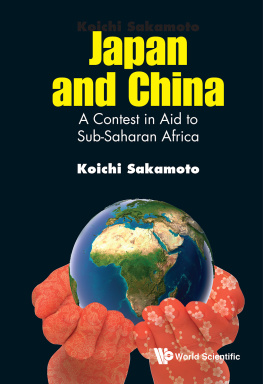Will Africa Feed China?

Oxford University Press is a department of the University of Oxford. It furthers the Universitys objective of excellence in research, scholarship, and education by publishing worldwide.
OxfordNew York
AucklandCape TownDar es SalaamHong KongKarachi
Kuala LumpurMadridMelbourneMexico CityNairobi
New DelhiShanghaiTaipeiToronto
With offices in
ArgentinaAustriaBrazilChileCzech RepublicFranceGreece
GuatemalaHungaryItalyJapanPolandPortugalSingapore
South KoreaSwitzerlandThailandTurkeyUkraineVietnam
Oxford is a registered trademark of Oxford University Press in the UK and certain other countries.
Published in the United States of America by
Oxford University Press
198 Madison Avenue, New York, NY 10016
Oxford University Press 2015
All rights reserved. No part of this publication may be reproduced, stored in a retrieval system, or transmitted, in any form or by any means, without the prior permission in writing of Oxford University Press, or as expressly permitted by law, by license, or under terms agreed with the appropriate reproduction rights organization. Inquiries concerning reproduction outside the scope of the above should be sent to the Rights Department, Oxford University Press, at the address above.
You must not circulate this work in any other form and you must impose this same condition on any acquirer.
Cataloging-in-Publication Data is on file with the Library of Congress.
ISBN: 9780199396856
eISBN: 9780199396870
For Amalie, Carrie, Jenna, Jeremy, Jesse, Lisa, Matthew, Max, Miles, and Oscar
CONTENTS
An official in Chinas Ministry of Agriculture once said to me: It is difficult to study this topic, even for us. I couldnt agree more. Hunger and food security, land grabbing, the fate of small farmers in faraway African villages, Chinese migration: all important topics, all with inadequate data, all covered by the international media with TV, radio, and newspaper stories of sharply varying accuracy. Over the past decade, fact and fiction have merged into a conventional wisdom on Chinas agricultural engagement in Africa that does not match the realities on the ground. Peeling away the layers of myths required extensive fieldwork, grounded in an appreciation of the long, complex history and evolution of Africas experience with China. The result is, I hope, a more balanced and realistic account that can provide a baseline for current and future analyses of Chinas rise and the impact this is likely to have in Africa.
This book had its origin in research I did during a year as a visiting senior research fellow in the Development Strategy and Governance Division at the International Food Policy Research Institute (IFPRI), in Washington, DC. I thank Margaret McMillan, Paul Dorosh, Xinshen Diao, Xiaobo Zhang, Kevin Chen, and Shenggen Fan for their help and support. I acknowledge with appreciation Johns Hopkins University School of Advanced International Studies, the Bill and Melinda Gates Foundation, Carnegie Corporation of New York, and the Smith Richardson Foundation, who all funded parts of this research.
For their encouragement in urging me to dig further into the issue of Chinese land grabs, I thank Tony Allan, Martin Keulertz, Suvi Sojamo, Jeroen Warner, Philipp Baumgartner, and Carlos Oya. Participants at a May 2014 conference we organized at Johns Hopkins University on Chinese agricultural investment in Africa provided a terrific way to share early findings from our fieldwork and compare notes. I am grateful to the participants: Lila Buckley, Solange Guo Chatelard, Chen Xiaochen, Jessica Chu, Srgio Chichava, Josh Maiyo, Margaret Myers, Nama Ouattara, Louis Putzel, Henry Tugendhat, Eckart Woertz, Xu Xuili, Yang Jiao and Zhou Jinyan. For their perceptive comments at our conference, I thank Peter Lewis, M. David Lampton, Yoon Jung Park, and Robert Thompson. Tang Xiaoyang and Janet Eom organized a very helpful workshop on the draft book manuscript at Tsinghua University in March 2015, for which I am grateful.
For repeated patience in answering so many questions, I thank Srgio Chichava, Aaron de Grassi, George Schoneveld, officials in Chinas Ministry of Agriculture, the China Africa Agricultural Investment Corporation, Ministry of Agriculture officials in every country I visited in Africa, the Chinese and African investors, and the workers and villagers who gave so generously of their time. Sigrid-Marianella Stensrud Ekman, Zhang Haisen, and Tang Xiaoyang deserve special thanks as coauthors, friends, and intrepid companions in fieldwork.
Many people have read and commented on various chapters, including Pieter Botellier, Anne Brautigam, Richard Brautigam, Carla Freeman, Solange Guo Chatelard, Srgio Chichava, Sigrid-Marianella Stensrud Ekman, Lin Hai, Elizabeth Holmes, Shubo Li, Mima Nedelcovych, Bruce Parrott, Helge Rnning, Tang Xiaoyang, Robert Thompson, Xu Xiuli, and Zhang Haisen. Their suggestions are much appreciated.
I have been blessed with the most amazing research assistants. Tang Xiaoyang has worked with me since 2007 and is now himself a professor at Tsinghua University. The talented, multilingual Bonnie Brodsky, Yunnan Chen, Nicollette Maunganidze, Ilaria Mazzocco, Noah Schlosser, and Yuanli Zhu all helped in the research for this book at various times, but Hanning Bi and Jyhjong Hwang were the heavy lifters. They tracked down impossibly difficult sources, made cold calls to Chinese businesses, improved my translations, answered e-mails at ridiculous hours, and generally made this a much better, more accurate, book. Their assistance is very gratefully acknowledged. Of course, I am responsible for any mistakes.
Parts of this book have been presented at seminars or conferences sponsored by the Center for Global Development, the University of Cape Town, the World Bank, the University of Wisconsin Land Tenure Center, the University of Pennsylvania, the International Food Policy Research Institute, and Johns Hopkins University. I thank the participants for their questions and comments. My editor at Oxford University Press, David McBride, encouraged me to write this book, shepherding it from idea to completion with just the right amount of judicious attention. Two anonymous reviewers added constructive suggestions. Ada Ho, Robin Washington, Alma Alcaraz and Shirley Raymundo helped keep me organized with humor and care, while Katie Weaver, Janet Eom and Molly Morrison skillfully brought the book through the last stages of production.
My husband and dearest companion, David Hirschmann, is my most insightful reader, gentlest critic, and most helpful editor. He brings the warm heart of Africa into my life on a daily basis. The youngest members of my family have done their best to distract me: on the shores of Moosehead Lake, in the snows of Vermont, splashing on the Potomac, or exploring the forests of Rambouillet. They are a continual reminder that there is so much more to life than conferences, books, and fieldwork. I dedicate this book to them.
| ADM | Archer Daniels Midland |
| AfDB | African Development Bank |
| ARDA | Agricultural and Rural Development Authority (Zimbabwe) |
| ATDC | agro-technology demonstration center |
| CAADP | Comprehensive Africa Agriculture Development Program |
| CAAIC | China-Africa Agriculture Investment Corporation |
| CAD-Fund | |

